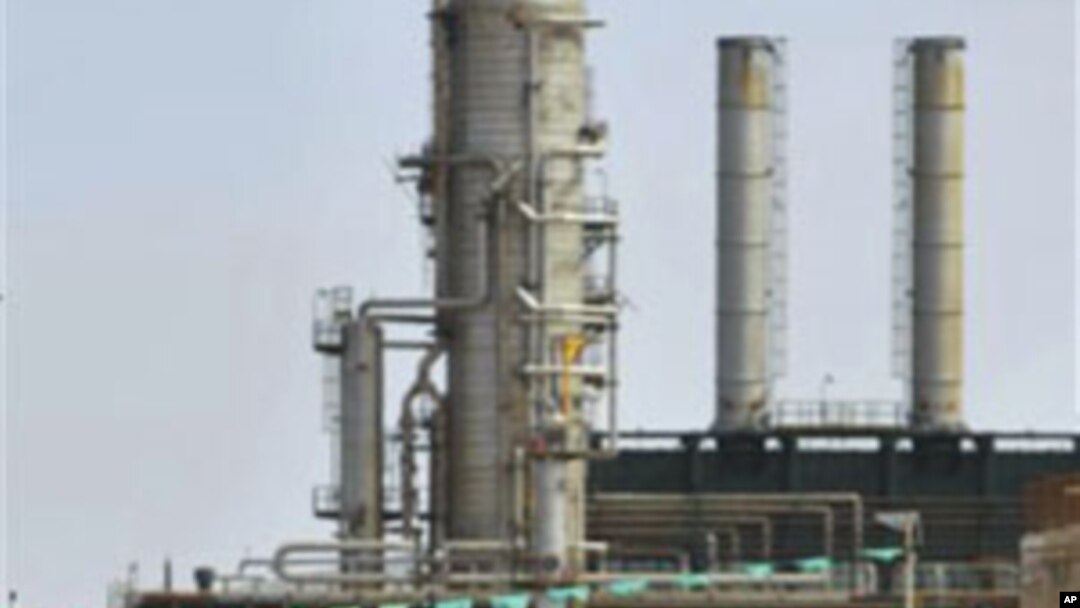As Libya's rebels and pro-government forces fight over cities and the country's political future, oil too is a key prize in the conflict, and some argue, a motive for outside intervention.
A man pumping gas near Tobruk, in eastern Libya, says people everywhere in the world are interested in oil. But he argues it should be shared, that there is no reason to fight over it.
Libya actually makes up but a tiny fraction of the world oil market, and despite soaring energy costs, energy analysts say the rebellion did nothing to supplies that couldn't have been replaced by other oil producers.
Charles Gurdon, director of the risk analysis firm Menas, says he believes the outside intervention in Libya's conflict was motivated by a genuinely humanitarian effort. That said, he notes there is a specific, regional interest in Libyan oil.
"I think the major issue really is Libya's importance to the markets of southern Europe. It produces red, light sweet and expensive crude for the Italian, French and Spanish markets. And obviously, being on the right side of the Suez Canal gives it distinctive advantages," Gurdon said.
Italy and France, of course, have been driving players, along with Britain and the United States, in the military campaign in Libya, begun after the U.N. Security Council authorized measures to protect Libyan civilians from their own government.
So, too, has Qatar, which has been helping rebels in the east sell their oil to the world.
But there is another, more unusual buyer - Beijing. China, along with Russia, has been wary of the democracy-seeking, anti-government wave washing over the Arab world. And both countries have been critical of what they see as Western powers overstepping the U.N. mandate. But business, apparently, is a separate matter.
"We understand that both Chinese and Italians have been in Tobruk with suitcases full of money buying crude oil. I think the [Gadhafi] regime is trying to prevent oil reaching Tobruk because obviously oil is the only source of revenue the opposition has," Gurdon stated.
Libya's rebel-held east is home to many of the nation's oil fields, refineries and terminals. While the rebel government has been able to get some oil out, the head of its oil ministry says for now, shipments are on hold.
An adviser to the Agoco, a state oil subsidiary now in rebel hands, says the main problem is damage from attacks by government forces on oil fields and a refinery south of Tobruk, as well as the refinery and terminal at Brega. Youssef Rahim Sharif says once the situation is more secure, Libyans in the east can get the oil flowing.
"We have lots of Libyans with expertise in the oil industry. We have engineers. We have administrators. We have technicians,” Sharif said. “We have all the technical staff - all Libyans who will be able to run the oil industry and run it [well]."
Sharif also promised a break with the practices of the government of Moammar Gadhafi, which is believed to be riddled with corruption. The issue of transparency is important enough for Human Rights Watch to call on the rebels - and Qatar - to make sure the sale of national assets are all accounted for and abide by international standards.
The Libyan government has promised preferential treatment to those who support its cause. On the rebel side, Sharif, too, indicates there is room for favoritism.
"The free Libya in the future will be willing to cooperate with all the international firms, especially the countries who supported our revolution and stood with us in these days - I mean the hard days. And these will be the ones who will be given the first benefits to be our partners in rebuilding Libya in the best way," Sharif explained.
Resumption of those sales will likely be the main way the rebel government can maintain its military campaign as well as keep the east running.
But is it legal? Agoco, despite being run by the rebels, is still part of a state enterprise and as such is arguably under U.N., U.S. and European sanctions.
"I think as far as the legal implications are concerned, I think it's a very gray area. But for the moment, I think the United Nations is turning a blind eye to the sale of crude by both sides," Gurdon said.
The United Nations, which became mired in scandal monitoring the sale of oil from Iraq in the 1990s, appears to have no interest in getting involved in such issues in Libya.
The matter is not of pressing concern to Colonel Gadhafi, who political observers believe has access to billions of dollars in cash.
But for the rebels, how soon they can get more oil to market, and whether legalities continue to be overlooked, may determine if they succeed.
Oil Said to Be Key to Libyan Rebels' Fortunes

The Zawiya Oil Refinery, west of Tripoli, Libya (File)

